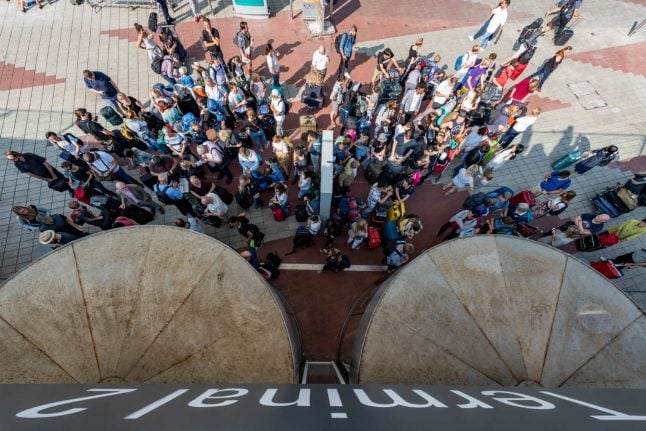The man had arrived at the airport, Germany’s second largest, from Bangkok and was on his way back to Madrid, reported the Süddeutsche Zeitung.
Prior to an arrival check, he had entered an area of the airport via an emergency exit door where only controlled passengers are allowed, an airport spokesman said.
The federal police then enacted “measures to avert danger” in compliance with EU regulation, it said in a statement, by shutting down Level 5 of Terminal 2 where international flights with passport control are handled.
As it was not initially clear whether the man had then travelled to Terminal 1 by bus, parts of this terminal were also shut down, said police.
Yet the man was “relatively quickly” found and asked to retrace his steps before parts of the airport could reopen, according to police.
Terminal 1 was reopened around 10:45am and at Terminal 2 at 11:20am after passengers were asked to check in again.

A list of affected flights at Munich Airport on Tuesday morning. Photo: DPA
Flights impacted
A total of 130 outgoing and incoming flights were cancelled, said the airport in a statement. By noon, around 7,500 passengers had been affected by cancellations, reported the reported the Süddeutsche Zeitung. Most were domestic flights, such as those to Berlin, Hamburg and Düsseldorf, and Berlin.
Vorübergehende Sperrung von Abfertigungsbereichen aufgrund bundespolizeilicher Maßnahmen. Für den gesamten Tag mussten aufgrund der Sperrung bislang rund 130 Flüge annulliert werden. https://t.co/PRKtpHctl2 #MPresse
— Munich Airport (@MUC_Airport) 27. August 2019
However, the airport did not provide any clear information about the number of delays on Tuesday, but encouraged passengers to check their flight status throughout the day.
On Tuesday, a total 1,200 take-offs and landings were planned. On average, 120,000 passengers travel through the airport per day during the busy summer holidays.
In the morning, some of the 5,000 people waiting outside of Terminal 2 complained on Twitter about not receiving any information at the affected terminals at Munich Airport.
Passengers also took to twitter to complain that there was no water stations around as they waited for the terminals to be reopened. The airport responded by handing out bottled water.
Really? We are in Terminal 1 and there are no announcements and there isn't any water ?
— Amna K Boheim (@AmnaKBoheim) 27. August 2019
Not the first time
This isn’t the first time an airport shut-down has left passengers in the lurch. At the start of the 2018 summer holidays, the police also closed Terminal 2 of Munich Airport because a 40-year-old woman had passed through a security gate without being checked.
A total of 330 flights were cancelled and more than 31,000 passengers were affected throughout the weekend. The damage amounted to millions of euros.
Following the incident, Munich Airport voluntarily distributed nearly 6,000 €50 vouchers to passengers.
However, the regional court in Erding ruled last year that airlines are not obliged to pay compensation if passengers are unable to fly due to an anti-terrorism measure.



 Please whitelist us to continue reading.
Please whitelist us to continue reading.
Member comments